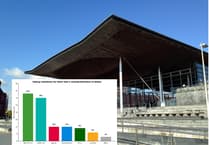TOURISM leaders in Wales have reiterated their calls for the Welsh Government to reconsider second-home council tax plans for the industry.
Wales Tourism Alliance (WTA), UK Hospitality Cymru (UKHC) and Professional Association of Self Caterers UK (PASC UK) are calling on the Welsh Government to listen to evidence collected in a survey of more than 1,500 self-catering businesses across Wales.
They say the proposed rules that come into force next year will have a “disproportionate and damaging economic impact” on the tourism industry.
Currently, self-catering properties in Wales must be available to let for a minimum of 140 days in any 12-month period, and actually let for at least 70 days to qualify for business rates rather than council tax – which has been dubbed a loophole by campaigners against second homes.
Under the new proposals, properties must be available to let for at least 252 days and actually let for at least 182 days to qualify for business rates – an increase of 160 per cent.
From April 2023, a self-catering business not meeting the new threshold would incur council tax for a second home, instead of business rates.
Welsh county councils will have the power to increase council tax on all these business by up to 300 per cent.
A survey, compiled jointly by the three organisations gathered the views of a quarter of Wales’ self-catering operators, who own around 8,000 properties.
As a result the trio of tourism groups are calling on the Welsh Government to increase the occupancy threshold for holiday let businesses from 70 to 105 days.
They say that in return they will work with Visit Wales, Welsh Government and other partners make the industry greener.
The survey revealed that tourism operators feel the proposed occupancy threshold will have a “disproportionate and damaging economic impact” on the self-catering sector, individual livelihoods and communities.
A joint statement by the organisations said: “As a tool to bring properties back into a market which is affordable to local people, it will not work. Rather, it will reduce local owners’ ability to earn an income and cause a decline in secondary jobs in hospitality, retail, house maintenance and cleaning.
“It will not safeguard the Welsh language as these businesses will be lost to wealthier outsiders prepared to meet the higher costs of having a second home or self-catering businesses in Wales.”
“Businesses agreed that the 70-day threshold was too low and have consistently recommended an increased to 105 days. Raising the bar to 182 days will have a hugely detrimental impact on the genuine businesses that operate in the sector.
“It is far above average occupancy and will simply drive prices down as owners race to meet the 182 days target.
“A decline in the availability of self-catering businesses will deter tourism, on which many hospitality businesses depend. Local pubs, restaurants and other hospitality and leisure businesses will see a severe drop in footfall at key tourist times.
"The industry supports higher thresholds to help distinguish between professionally run self-catering businesses and second homes. Unfortunately, these proposals don’t reflect the outcome of the Welsh Government’s own consultation on the issue and we risk losing valuable, locally-owned, small businesses as a consequence.
“We urge the Welsh Government to review their figures and reconsider the damage that these proposals will cause to the economic sustainability of communities they purport to safeguard."
When the changes to tax rules were announced earlier this year, Rebecca Evans, Minister for Finance and Local Government, said: “These changes will give more flexibility to local authorities and provide more support to local communities in addressing the negative impacts that second homes and long-term empty properties can have.”
Plaid Cymru Designated Member Sian Gwenllian MS said: “It is clear that we as a country are facing a housing crisis.
“So many people cannot afford to live in their local areas, and the situation has worsened during the pandemic.
“These changes will make a difference, enabling councils to respond to their local circumstances, and start to close the loophole in the current law.
“It’s a first, but important, step on a journey towards a new housing system that ensures that people have the right to live in their community.
"Through the Co-operation Agreement, we are committed to introducing a package of measures to tackle the injustices in the housing market.
“This announcement is just one part of that wider package.
“Second homes are a symptom of a wider problem - a market that treats property, not as a home, but as a way of making a profit.
“By working across the parties in the Senedd, we will introduce more measures, as soon as we can, to make house prices and rents genuinely affordable for people.”





Comments
This article has no comments yet. Be the first to leave a comment.